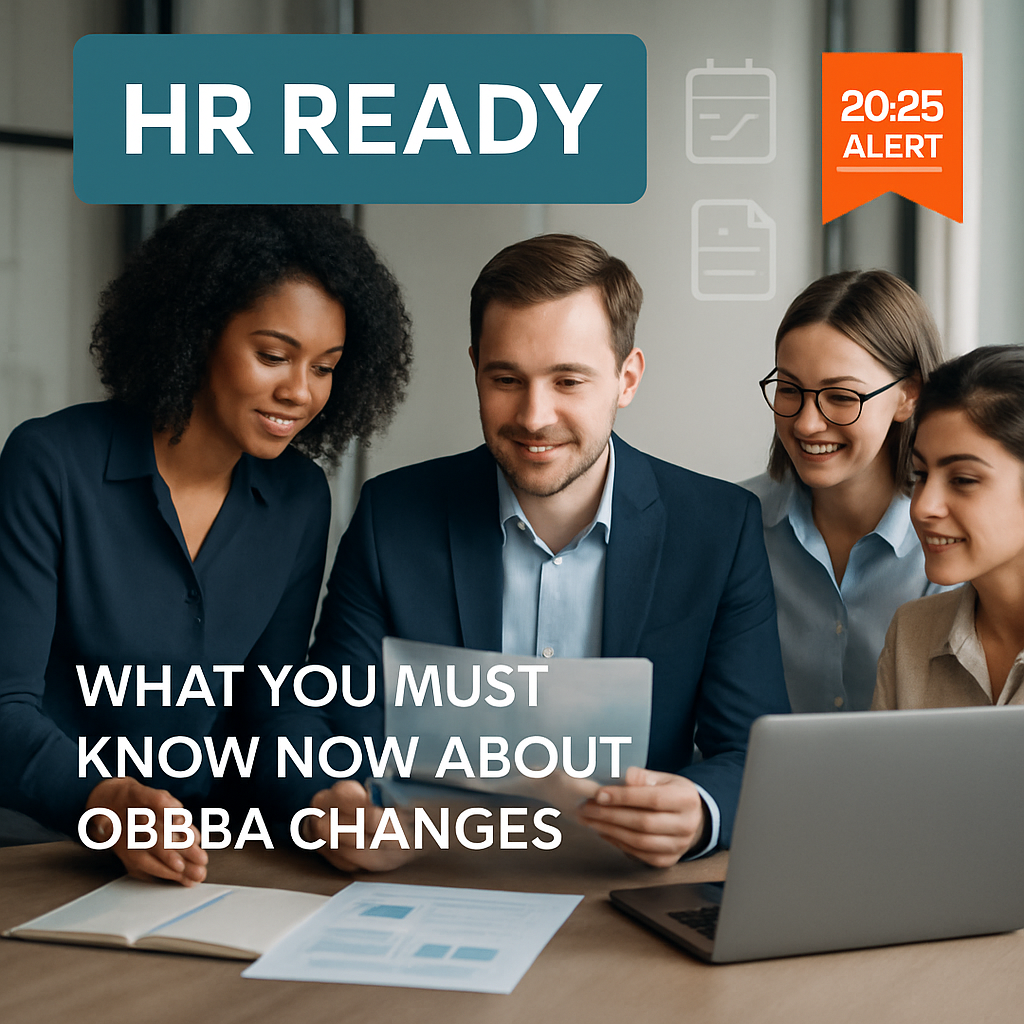Changes big and small tend to land on HR’s doorstep and the One Big Beautiful Bill Act (OBBBA) is no exception.
With new deductions for overtime, tips, and auto loan interest entering into effect, HR teams need to get ready. Not because you have to, but because your people deserve clarity, confidence, and trust during times of tax change.
In this post, we’ll walk HR professionals through what’s coming, how to prepare, and how to support your workforce so your HR heroes don’t get buried in confusion. Think of this as your OBBBA readiness playbook.
What Is OBBBA 2025 & Why HR Should Care
The OBBBA (One Big Beautiful Bill Act) introduces a set of new deductions and requirements that affect payroll, tax withholding, and reporting from 2025 through 2028. Some key points:
- Employees may deduct qualified tips, qualified overtime compensation, and auto loan interest (for personal, eligible vehicles) under certain conditions.
- There will be new reporting and tracking responsibilities for employers, particularly around tip income and overtime premium portions.
- Importantly, there are no immediate changes in 2025 to W-2, 1099, 941, or withholding tables. These forms and rates remain the same for 2025.
- Because withholding tables haven’t changed yet, some employees may experience over-withholding in 2025 (i.e. more federal tax withheld than ultimately needed).
So HR has a dual role: make sure your systems are ready to collect and flag the right new data, and guide employees through the ambiguity until the IRS issues more definitive guidance.
How HR Teams Can Best Prepare (Your OBBBA Readiness Checklist)
Here’s your actionable playbook. Pick what you can start now (yes, even before final rules drop).
1. Audit Your Payroll / HR Systems & Capabilities
- Review whether your payroll system can break out qualified overtime premium pay separately from base pay (only the overtime “premium” portion qualifies for deduction).
- Confirm whether your system can track tip income separately and mark occupations that “customarily and regularly receive tips.”
- Check auto loan interest reporting workflows: lenders will need to furnish information (interest paid, VIN, origination, etc.). HR / payroll may need to coordinate.
- Ensure your system can flag age for senior deduction eligibility (for employees aged 65+)
2. Map Out Required Data Fields & Reporting Gaps
- List all the new fields you’ll need: tip amounts, overtime premium, auto loan interest, validation of occupations, vehicle VIN, etc.
- Compare with your current data- where there are missing fields, decide whether to collect retrospectively or approximate (if acceptable) under transition relief rules.
- Document processes for how data flows: from accrual, to pay, to reporting to IRS.
3. Build a Communication Strategy (Early & Transparent)
- Start informing employees now: “Changes are coming. Here’s what we know. Here’s what we’re doing.”
- Educate via internal channels: webinars, FAQ pages, short emails, “Did you know?” blurbs.
- Clarify that withholding tables don’t change for 2025- employees will still need to file for deductions later.
- Warn about potential over-withholding and encourage employees to monitor their paychecks.
4. Train Payroll / HR Teams & Stakeholders
- Provide internal training to your payroll, HR, and finance staff on OBBA’s rules, phases, and data needs.
- Teach the “premium portion” logic for overtime.
- Prepare for questions: some employees will want to know when they’ll see changes in their paycheck (which in many cases will be only when they file taxes, not in 2025).
5. Monitor IRS Releases, Guidance & Transitional Relief
- The IRS has released interim guidance (FS-2025-03) and has promised transition relief for 2025.
- Track when the IRS will publish the list of occupations eligible for tip deduction — deadline is anticipated October 2, 2025.
- Watch for updates on forms, withholding tables, and employer reporting rules (possibly for 2026).
- Be ready to adapt your processes once more formal rules drop.
6. Plan for Employee Support & Education
- Host Q&A sessions about OBBBA, what’s changing, and what employees should expect.
- Build simple explainer content (articles, videos) about deductions of tips / overtime / auto interest.
- Encourage employees to consult tax advisors for their individual situations.
- Use FAQs or knowledge base sections to centralize trusted answers.
Why This Matters (From a People-First HR Lens)
- Trust & Transparency- How you guide employees through change affects morale. When HR anticipates, communicates, and supports, people feel cared for, not surprised.
- Minimizing Confusion / Anxiety- Tax changes can be intimidating. HR that simplifies the journey helps people stay calm.
- Reducing Burden & Firefighting- A little preparation now saves hours of support tickets, confusion calls, and form corrections later.
- Signaling HR Value- When HR helps navigate policy change, it elevates HR’s role from compliance steward to strategic partner.
In short, OBBBA 2025 is an opportunity for HR heroes to shine, not just by doing the technical work, but by showing leadership, empathy, and clarity when things change.
